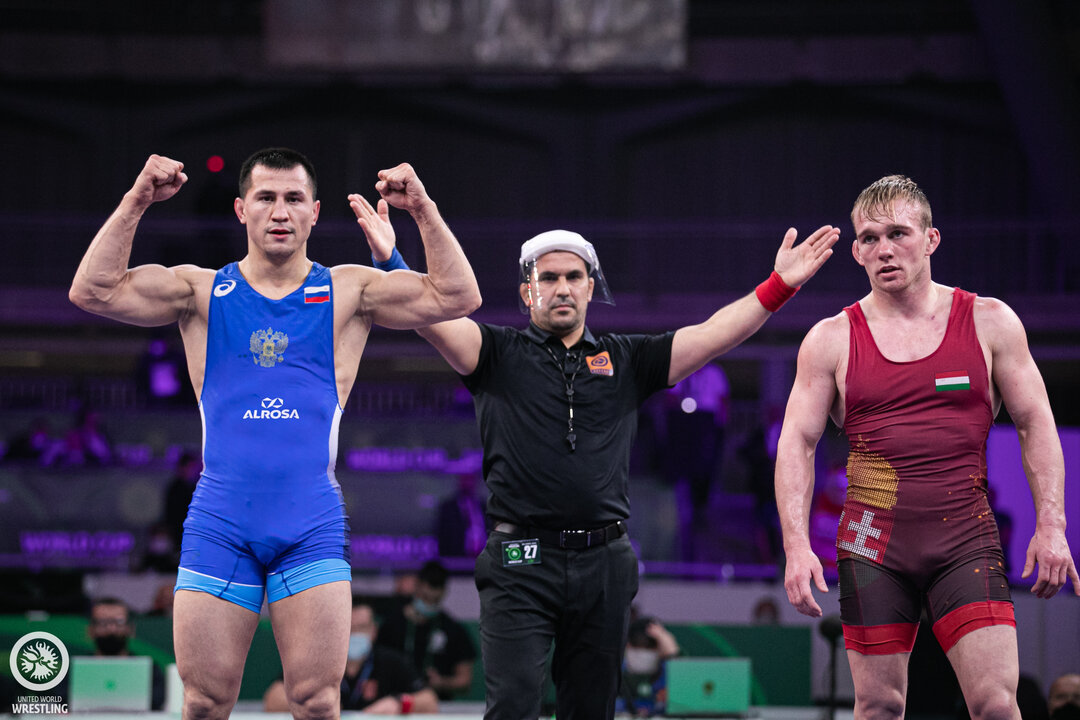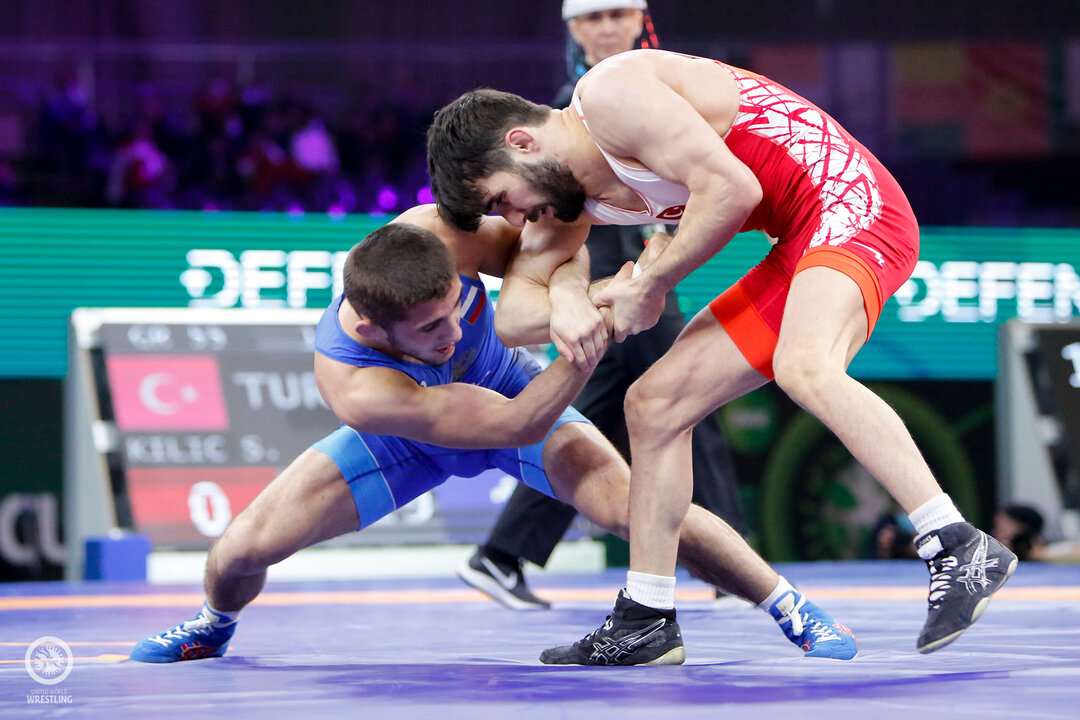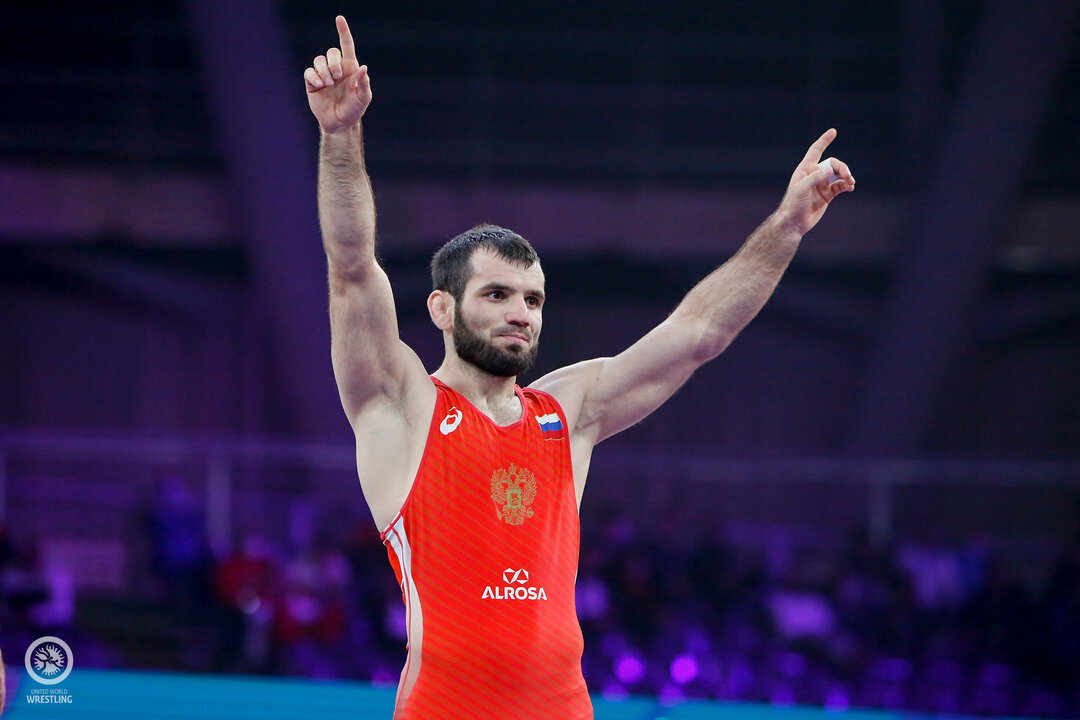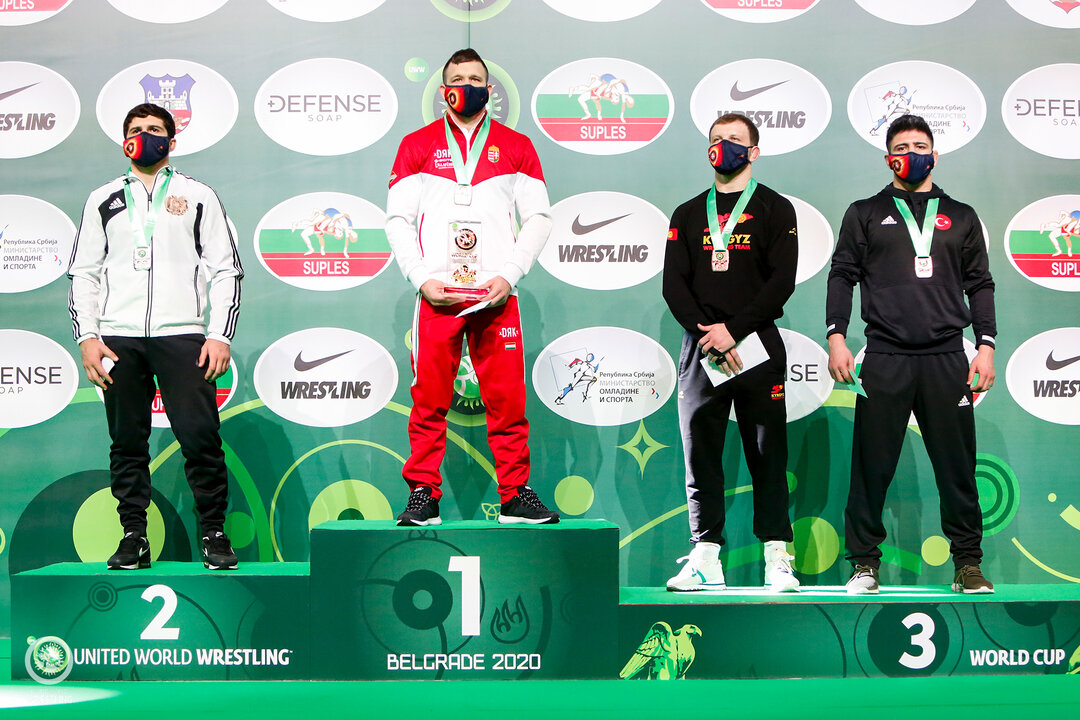Maskevich Stuns Chakvetadze, Russia Bags 3 Gold Medals
Sunday, December 13, 2020 - 21:54 By Andrew Hipps

Links:
Day 2 Photos
Interview with Davor STEFANEK (SRB)
BELGRADE, Serbia (December 13) -- Russia made a strong statement Sunday at the Individual World Cup, winning three of the first five gold medals, but it was a young star from Belarus who stole the show in the final match of the night in Belgrade, Serbia.
After Russia started the night 3-for-3 in Sunday's Greco-Roman finals, Kiryl MASKEVICH (BLR), a decided underdog, stepped on the mat to face Russian Olympic champion Davit CHAKVETADZE (RUS).
The 22-year-old Belarusian was poised and confident, scoring the match's first point off a passivity. He extended his lead to 3-0 when Chakvetadze did not get set in the par terre position. Maskevich then lifted Chakvetadze from par terre and executed a five-point suplay before turning him for good measure to claim a 10-0 technical superiority in the first period.
Winning gold medals for Russia on Sunday were Roman VLASOV (77kg), Emin SEFERSHAEV (55kg) and Nazir ABDULLAEV (67kg).
Roman VLASOV (RUS) after winning gold at 77kg (Photo: Kadir Caliskan, UWW)
Vlasov, a two-time Olympic champion, hit a big throw on his way to a 6-1 victory over Zoltan LEVAI (HUN) in the 77kg finals. Vlasov scored first off a passivity and then executed a five-point throw to take a commanding 6-0 lead in the first period. Levai would get one the scoreboard in the second period off a passivity but was never able to threaten Vlasov.
Emin SEFERSHAEV (RUS) became the first champ at Individual World Cup, winning gold at 55kg (Photo: Gabor MARTIN, UWW)
Sefershaev, a U23 world silver medalist, claimed the gold at 55kg with an 8-0 technical superiority over Serif KILIC (TUR), a past junior world champion. The first period saw one only one point scored as Sefershaev earned a passivity point. The Russian turned it up in the second period. He scored another point off a passivity and then used a two-point throw to go up 6-0. Sefershaev scored two takedowns in the final 25 seconds to earn the technical superiority.
Nazir ABDULLAEV (RUS) raises his arms after winning gold at 67kg (Photo/Gabor MARTIN, UWW)
Abdullaev, a 2020 European silver medalist, needed a late score to edge 2014 Youth Olympic champion Islambek DADOV (AZE) 2-1 in the gold-medal match at 67kg. The two wrestlers traded passivity points, with Dadov scoring the second one in the final period to take a criteria lead. Abdullaev kept the pressure on and earned a step-out point with 23 seconds remaining, which proved to be the difference.
Champion Balint KORPASI (HUN) and the other 72kg medalists on the award stand (Photo/Gabor MARTIN, UWW)
Balint KORPASI (HUN), a 2016 world champion and four-time world medalist, captured the gold at 72kg with a won a hard-fought 1-1 criteria win over world No.10 Malkhas AMOYAN (ARM). Amoyan scored the first point of the match off a passivity and led 1-0 at the break. In the second period, Korpasi scored a point off passivity to take the lead and held on for the victory.
Eldaniz AZIZLI (AZE) and Abdelkarim FERGAT (ALG) won the bronze medals at 55kg. Azizli shut out Balbai DORDOKOV (KGZ) 3-0, while Fergat topped Artiom DELEANU (MDA) 6-4.
Slavik GALSTYAN (ARM) won by fall over Artur POLITAIEV (UKR) to claim a bronze medal at 67kg. Roman PACURKOWSKI (POL) defeated Khalmurat IBRAGIMOV (KGZ) 6-3 to earn the other bronze at 67kg.
Cengiz ARSLAN (TUR) and Ruslan TSAREV (KGZ) won the bronze medals at 72kg.
Host nation Serbia earned two bronze medals on Sunday, with Viktor NEMES taking bronze at 77kg and Zurabi DATUNASHVILI winning bronze at 87kg.
Also claiming bronze medals on Sunday were Alexandrin GUTU (MDA) at 77kg and Semen NOVIKOV (UKR) at 87kg.
Greco-Roman Medal Match Results
55kg
GOLD: Emin SEFERSHAEV (RUS) df. Serif KILIC (TUR) by VSU, 8-0
BRONZE: Eldaniz AZIZLI (AZE) df. Balbai DORDOKOV (KGZ) by VPO, 3-0
BRONZE: Abdelkarim FERGAT (ALG) df. Artiom DELEANU (MDA) by VPO1, 6-4
67kg
GOLD: Nazir ABDULLAEV (RUS) df. Islambek DADOV (AZE) by VPO1, 2-1
BRONZE: Slavik GALSTYAN (ARM) df. Artur POLITAIEV (UKR) by VFA, 4-4
BRONZE: Roman PACURKOWSKI (POL) df. Khalmurat IBRAGIMOV (KGZ) by VPO1, 6-3
72kg
GOLD: Balint KORPASI (HUN) df. Malkhas AMOYAN (ARM) by VPO1, 1-1
BRONZE: Cengiz ARSLAN (TUR) df. Valentin PETIC (MDA) by VPO1, 5-1
BRONZE: Ruslan TSAREV (KGZ) df. Aik MNATSAKANIAN (BUL) by VPO1, 3-1
77kg
GOLD: Roman VLASOV (RUS) df. Zoltan LEVAI (HUN) by VPO1, 6-1
BRONZE: Viktor NEMES (SRB) df. Karapet CHALYAN (ARM) by VPO1, 4-1
BRONZE: Alexandrin GUTU (MDA) df. Yasaf ZEINALOV (UKR) by VPO1, 6-4
87kg
GOLD: Kiryl MASKEVICH (BLR) df. Davit CHAKVETADZE (RUS) by VSU, 10-0
BRONZE: Semen NOVIKOV (UKR) df. Hossein Ahmad NOURI (IRI) by VSU1, 12-4
BRONZE: Zurabi DATUNASHVILI (SRB) df. Fabio PARISI (ITA) by VPO1, 3-1


 Rei HIGUCHI (JPN) wrestles Yowlys BONNE (CUB) at the Rio Olympics. (Photo: UWW / Tony Rotundo)
Rei HIGUCHI (JPN) wrestles Yowlys BONNE (CUB) at the Rio Olympics. (Photo: UWW / Tony Rotundo) Rei HIGUCHI clinched his spot on the Japan team for the World Championships after winning the gold medal at 57kg. (Photo: Japan Wrestling Federation / Takeo Yabuki)
Rei HIGUCHI clinched his spot on the Japan team for the World Championships after winning the gold medal at 57kg. (Photo: Japan Wrestling Federation / Takeo Yabuki) Rei HIGUCHI (JPN) on a motorbike in Tokyo. (Photo: Sachiko Hotaka)
Rei HIGUCHI (JPN) on a motorbike in Tokyo. (Photo: Sachiko Hotaka)
Share your thoughts.
Comments